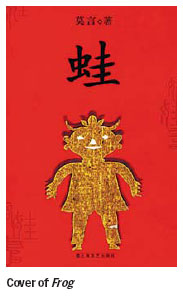Newest novel a rural drama
Updated: 2012-10-12 08:00
By Liu Jun (China Daily)
|
||||||||
Reading Mo Yan's latest novel, Wa, or Frog (2009), is both rewarding and unsettling. Like all his previous works, this one is full of action and drama. But while his earlier works created heroic protagonists such as "My Grandpa" and "My Grandma" who waged war against Japanese invaders in the past, Frog chronicles the painful, almost bizarre, modernization of the "Northeast Gaomi Township", which Mo has created over the past decades based on his rural hometown in East China's Shandong province.
Tension and a surprising dark humor come from a cast of characters named after human organs, such as Chen Bi (nose) and his wife Wang Dan (gall bladder), Xiao Shangchun (upper lip) and his son Xiachun (lower lip).
|
 |
The chief character, "My Aunt" Wan Xin (heart), was seen as a fairy godmother in her youth because she was a modern midwife who delivered roughly 10,000 babies. But as national family planning kicked in, she quickly degenerated into the demon incarnation as it fell upon her shoulders to enforce the policy, a hard choice for the world's most populous nation.
The description of the three deaths she causes in the pursuit of errantly pregnant women is so striking that her flight from an army of vengeful frogs pales by comparison.
In ancient mythology, the frog is a totem of fertility and its Chinese name wa is a phonetic synonym to baby or child.
"My Aunt" later tries to atone for her crimes by breathing life into pottery babies, which are sold as popular souvenirs to tourists eager for offspring.
But the thin line of morality is again blurred as the once upright midwife helps her nephew Ke Dou (Tadpole, the narrator of the story) and his infertile wife have a baby via a surrogate mother.
The plot flashes by at lightning speed, leaving the reader very much depressed at the end.
The latter part of the novel clearly drew inspiration from social events, such as a toy factory fire that killed and deformed hundreds of female migrant workers, and the underground surrogate mothers serving the rich and powerful.
It is a time when black and white are no longer distinct and against a background set in shades of grey, the bizarre becomes normal as materialistic cravings erode the human conscience. The only consolation offered is a reminder to love life.
Each of the book's chapters carries a letter from Ke Dou to a Japanese writer. Though Mo denies this is Oe Kenzaburo, who won the Nobel Prize for literature in 1994 and had visited Mo's hometown and met his aunt, the prototype of "My Aunt", he did admit drawing much inspiration from that trip.
liujun@chinadaily.com.cn

 Relief reaches isolated village
Relief reaches isolated village
 Rainfall poses new threats to quake-hit region
Rainfall poses new threats to quake-hit region
 Funerals begin for Boston bombing victims
Funerals begin for Boston bombing victims
 Quake takeaway from China's Air Force
Quake takeaway from China's Air Force
 Obama celebrates young inventors at science fair
Obama celebrates young inventors at science fair
 Earth Day marked around the world
Earth Day marked around the world
 Volunteer team helping students find sense of normalcy
Volunteer team helping students find sense of normalcy
 Ethnic groups quick to join rescue efforts
Ethnic groups quick to join rescue efforts
Most Viewed
Editor's Picks

|

|

|

|

|

|
Today's Top News
Health new priority for quake zone
Xi meets US top military officer
Japan's boats driven out of Diaoyu
China mulls online shopping legislation
Bird flu death toll rises to 22
Putin appoints new ambassador to China
Japanese ships blocked from Diaoyu Islands
Inspired by Guan, more Chinese pick up golf
US Weekly

|

|







